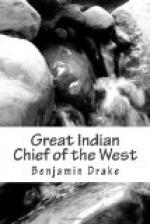[Illustration: WABOKIESHIEK, THE PROPHET]
On the 21st of September, General Scott and Governor Reynolds concluded a treaty with the Winnebagoes, and the Sacs and Foxes; the provisions of which have been stated. For the faithful performance of it, on the part of the Indians, it was stipulated that Black Hawk and his two sons, Wabokieshiek the Prophet, Naopope and five other chiefs of the hostile band, should be retained as hostages during the pleasure of the President. The remainder of the prisoners, captured during the campaign, were set at liberty.
In recurring to the causes which led to this war and the spirit and military skill with which it was conducted, there is nothing on which a citizen of the United States can dwell with satisfaction. Looking alone to the official documents, that have been published on the subject, it would appear that the Indians were the aggressors—that they invaded the territory of the United States, marking their path with outrages upon the unoffending citizens; and that they were met, encountered, and defeated, under circumstances which shed renown upon the arms and humane policy of the government. But it is necessary, in doing justice to both parties in this contest, to destroy this flattering picture.
Some of the causes which operated to render Black Hawk and his band, discontented with the conduct of the United States, and with their condition upon the west side of the Mississippi, have been enumerated. Whatever may have been their ulterior views, in returning within the limits of the state of Illinois, in the spring of 1832, it cannot be supposed that they came with any immediate hostile intentions. Had they been determined upon war, they would neither have encumbered themselves with their wives and children, nor have openly recrossed the Mississippi, near to Fort Armstrong, when they knew there was an officer of the United States army, with a body of troops, stationed at that point, for the express purpose of preserving peace upon the frontier. Such movements would have been at variance with the well known military policy of the Indians. Judging from the success of General Gaines, in removing this same band, in 1831, without blood shed, to the west side of the Mississippi, it has been supposed, that a pacific conference between the commandant of Fort Armstrong and Black Hawk, in 1832, before he had commenced his ascent up Rock river, would have resulted in the peaceable return of the Indians to their own hunting grounds. The condition of things at that time, warrants such a belief, and the subsequent declarations of the Indians, strengthen the opinion, that had the experiment been made, it would have been successful. It is true, that the commanding officer at Fort Armstrong, sent two messages to Black Hawk upon this subject; but the first is represented by the Indians to have been an order for them to return; and the second, that if they did not, they would be pursued and forced to recross the Mississippi. These efforts failed, but it does not follow that a friendly council upon the subject, would not have resulted differently.




